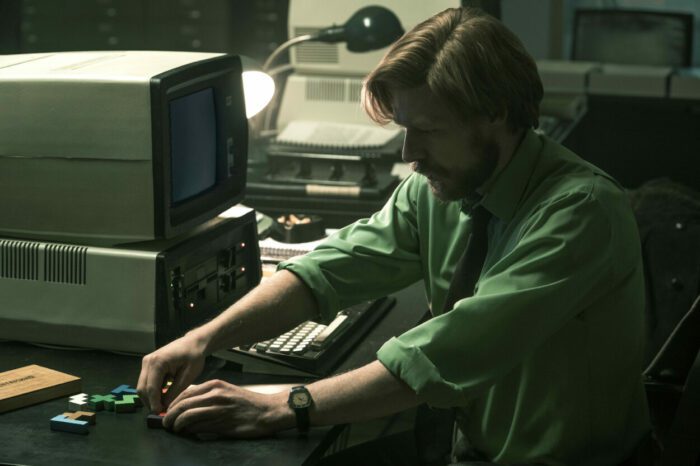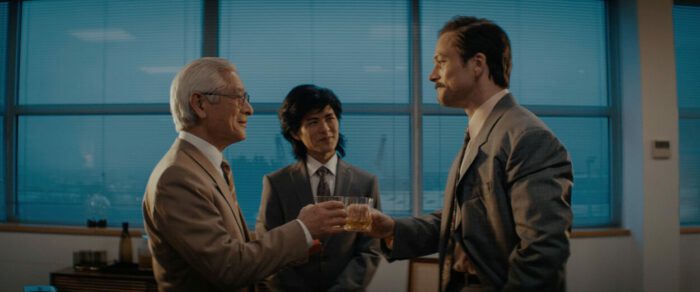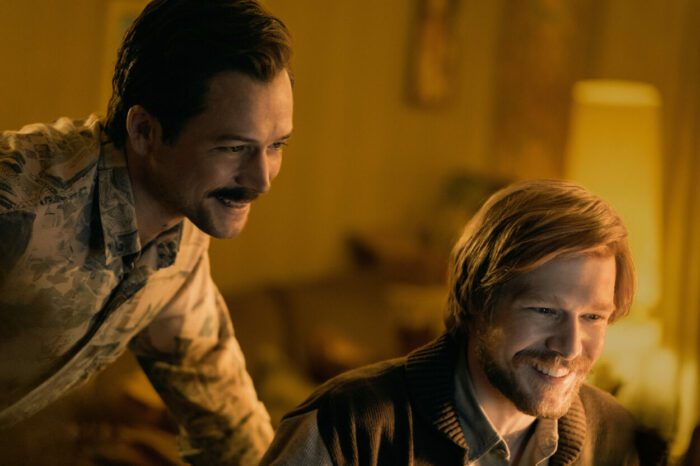Early on in Tetris, Taron Egerton’s main character Henk Rogers shares an admission with his furious boss about why he put himself into greater financial debt to back an unknown video game from The Soviet Union he stumbled upon at a consumer electronics show in Las Vegas. Leaning over and speaking low with clear eyes relaying bewilderment, he talks about seeing those soon-to-be iconic blocks still falling in his dreams hours and days after playing the game. Memories fill Tetris viewers, and they immediately picture the exact same thing.
It doesn’t matter if you’re an OG that played the game on an ancient PC, a Nintendo console, and Game Boy or a young whippersnapper playing it on your phone now. One could argue that, next to Pac-Man, no classic video game has ever been more addictive for all ages than Tetris. The game itself is simple, special, and hypnotic. The giddiness to play Tetris has not faded a kilobyte with age.
Folks, in that very moment the blocks start falling in your head, the Apple TV+ film hooks you the same way the game did whenever you first encountered it. For Jon S. Baird’s film to even dip a toe or two beyond the gaming screens into how the legendary video game came to be coveted, leverages that addiction and giddiness in film form. Like the game itself, Tetris’s own narrative blocks of stakes stack precariously higher and the noise it makes gets louder and faster in tempo.

After an opening narration goes thankfully away, the movie follows Egerton’s Tokyo-based Rogers of the small fry Bulletproof Software after he nabbed Japanese PC and video game console rights for Tetris in Vegas. The original arcade rights appear to be controlled by Robert Stein (Toby Jones, remarkably nebbish and cutthroat at the same time). He has been the one person to successfully do business with the government-controlled Elorg organization in Moscow that monopolized all domestic computer hardware and software and employed Tetris creator Alexey Pajitnov (Nikita Yefremov of Londongrad).
With the buzz of Tetris swelling in the burgeoning gamer scene, Henk risks all his available collateral and enters a contentious Iron Curtain bidding war. Henk’s chief opposition are Stein’s partners, the petty father-son duo of Robert and Kevin Maxwell (award-winning thespians Roger Allam and Anthony Boyle, respectively) of the Mirror Group media empire, who flaunt clout extending all the way to Mikhail Gorbechev. Meanwhile, Rogers ingratiates himself with both Alexey and the representatives from Nintendo. Minoru Arakawa (Ken Yamamura of The Wolverine) and Howard Lincoln (Andor’s Ben Miles) are sitting on the next big thing: Game Boy, meaning the handheld rights are the newest lucrative target held by Elorg.

From there, Filth and Stan & Ollie director Jon S. Baird squeezes every drop of potential intrigue from the business gamesmanship laid out in Noah Pink’s debut feature screenplay. On paper, whirring fax machines and cocksure sales pitches shouldn’t be exciting. Yet, the overbearing and manipulative Soviet setting makes all the difference. The duplicitous industrialists and government stooges with fingers in the multi-million-dollar pie in Tetris turn every meeting into a dangerous confrontation with international risks.
The villainous outside government influences may sound ominous, but the core of the multi-layered economic duel in Tetris comes down to character. While money is still the chief motivator for the bereft communist country, the Russian higher-ups and, of course Alexey Pajitnov himself, are attempting to find a partner that is the best fit to be the steward of this special intellectual property. Kept promises need to be thicker than wallets and checkbooks to weed out the selfish profiteering cheaters in the mix. Through it all, Tetris genuflects to the notion that “good ideas have no borders.”

The international casting is stellar across the board. Led by Oleg Stefan’s wonderfully slick Elorg administrator and prodded further by Igor Grabuzov’s political bully, Tetris has a dynamite middle sequence where the negotiating Russians play “Musical Boardrooms” on the foreign suitors. Each eager party– not realizing their competitors are there at the same time mere doors and hallways apart– shoots their clip of pissing contest offers only to receive varying levels of cold shoulders, harmful threats, and deceitful tactics in return. A different movie would pile everyone in one room for a bombastic display of bluster and shouting. Instead, the sharp editing and dramatic irony creates a snappy flow of competition made more clever by shrewd acting.
Tetris marks its unquestioned hero right from the start. Taron Egerton’s Henk wears the “dumb, but honest” assumption like a badge of honor in a very entertaining performance. The only trait he proudly wears harder is the Rocketman actor’s put-upon ‘stache. Egerton’s every persuasive line comes from an embouchure of clenched jaws, scrunched cheeks, and pushed lips doing everything they can to flex facial hair like an Olympic barbell. Boy, does it ever work for him.

Egerton’s charm turns what could have been a semi-lame biopic into an R-rated, borderline caper film of corporate espionage circling dire Cold War consequences. The peppy tone and style of Tetris flirts with the energy of peak 1990s/2000s Steven Soderbergh. Composer Lorne Balfe’s musical score rattles the heightened suspense with playful riffs peppered along the way. With a wink and a smile, Baird and his team also use a heaping scoop of 8-bit graphic VFX for character introductions, chapter transitions, and establishing shots for the jet-set scene changes. By the time Tetris reaches a climactic car chase set to Bonnie Tyler’s “Holding Out For a Hero” sung in the host country’s language, the fun factor is strong and, dare I say it, addicting.



